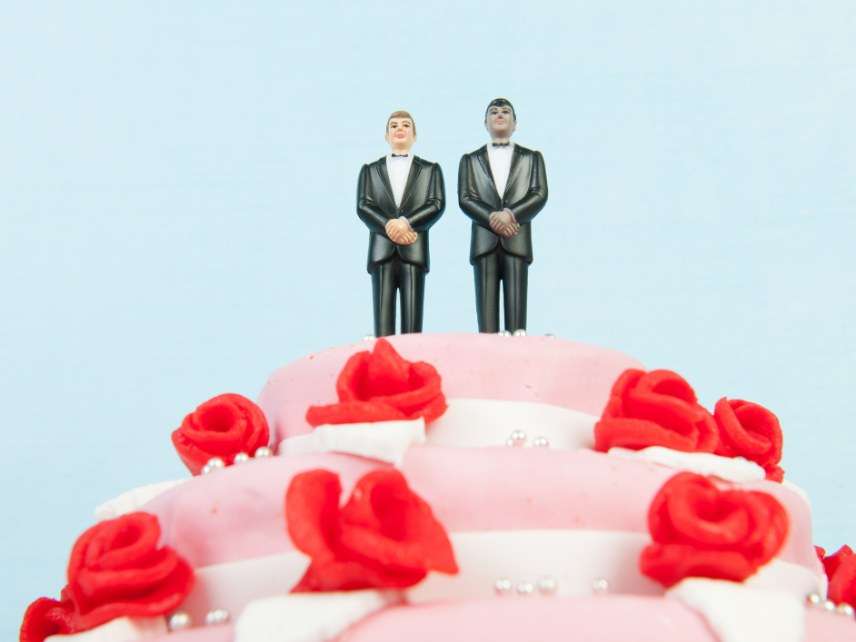Supreme Court Rules for Baker in Gay Wedding Cake Case But Carefully Avoids Central Debate
This 7-2 ruling is more about Colorado's biased enforcement of discrimination law than freedom of expression.

The Supreme Court ruled 7–2 this morning that the State of Colorado erred in punishing a baker for refusing to make a wedding cake for a same-sex couple. But the approach the court took guarantees that this debate is far from over.
The court did not rule that cake-baking is a protected form of free expression. Instead it said the Colorado Civil Rights Commission (CCRC) showed open hostility to the baker's attempt to assert his religious beliefs as a reason to reject the couple's request, and that the state thus did not neutrally enforce its antidiscrimination law.
In Masterpiece Cakeshop Ltd. vs. Colorado Civil Rights Commission, bakery owner Jack Phillips refused to sell a wedding cake to a gay couple because he had religious objections to same-sex marriage. Colorado ruled that this counted as discrimination against gay people, which violates state law. Phillips countered that he would sell any other baked goods to gay people, but he wouldn't make or sell goods for same-sex wedding ceremonies, because he felt as though he was being compelled to support an idea (that gay marriage is valid) that he did not believe.
The court punted on the issue of whether creating a wedding cake (or other wedding-related goods) is a form of free expression. Instead the justices ruled that the CCRC took a dismissive, hostile approach toward Phillips' religious-based objections when compared to other kinds of cases that came before them. From the majority decision:
The Civil Rights Commission's treatment of his case has some elements of a clear and impermissible hostility toward the sincere religious beliefs that motivated his objection. That hostility surfaced at the Commission's formal, public hearings, as shown by the record. On May 30, 2014, the seven-member Commission convened publicly to consider Phillips' case. At several points during its meeting, commissioners endorsed the view that religious beliefs cannot legitimately be carried into the public sphere or commercial domain, implying that religious beliefs and persons are less than fully welcome in Colorado's business community. One commissioner suggested that Phillips can believe "what he wants to believe," but cannot act on his religious beliefs "if he decides to do business in the state." Tr. 23. A few moments later, the commissioner restated the same position: "[I]f a businessman wants to do business in the state and he's got an issue with the— the law's impacting his personal belief system, he needs to look at being able to compromise."
The commissioner even went so far as to compare Phillips' invocation of his sincerely held religious beliefs to defenses of slavery and the Holocaust. This sentiment is inappropriate for a Commission charged with the solemn responsibility of fair and neutral enforcement of Colorado's antidiscrimination law—a law that protects discrimination on the basis of religion as well as sexual orientation.
Justice Anthony Kennedy wrote the opinion. Also siding with the baker were Clarence Thomas, Stephen Breyer, Neil Gorsuch, Samuel Alito, Elena Kagan, and Chief Justice John Roberts. Thomas, Gorsuch, and Kagan all wrote concurring opinions. Only Ruth Bader Ginsburg and Sonia Sotomayor supported the commission.
A completely different case that trolled those who wanted to force the baker to make the cake ended up being relevant to the decision. As the Masterpiece Cakeshop controversy was playing out in 2015, a gentleman named Bill Jack went to another Colorado bakery to demand a cake that was decorated with text opposing same-sex marriage. When the bakery refused, he also filed a complaint. His was rejected, with the CRCC concluding that a bakery couldn't be forced to write messages that it found offensive or objectionable. The CRCC appeared to treat the nature of the objections very differently. The majority concluded:
The Commission's hostility was inconsistent with the First Amendment's guarantee that our laws be applied in a manner that is neutral toward religion. Phillips was entitled to a neutral decisionmaker who would give full and fair consideration to his religious objection as he sought to assert it in all of the circumstances in which this case was presented, considered, and decided. In this case the adjudication concerned a context that may well be different going forward in the respects noted above. However later cases raising these or similar concerns are resolved in the future, for these reasons the rulings of the Commission and of the state court that enforced the Commission's order must be invalidated.
In a separate concurring opinion, Justice Clarence Thomas agreed that the CCRC was not neutrally enforcing its antidiscrimination laws, but he took the argument further. He does see the creation of custom wedding cakes as expressive speech: "Behind the counter Phillips has a picture that depicts him as an artist painting on a canvas. Phillips takes exceptional care with each cake that he creates—sketching the design out on paper, choosing the color scheme, creating the frosting and decorations, baking and sculpting the cake, decorating it, and delivering it to the wedding."
But only Gorsuch joined Thomas' opinion. The other judges were much more focused on the disparate treatment of Phillips' religious objections. So the courts did not establish a precedent here on whether people who provide goods and services to weddings can be compelled to provide them to same-sex couples. Indeed, the decision may actually give states a map on how to enforce antidiscrimination laws in a way that would require bakers (and other businesses) serve gay weddings.
Read the ruling here.


Show Comments (222)